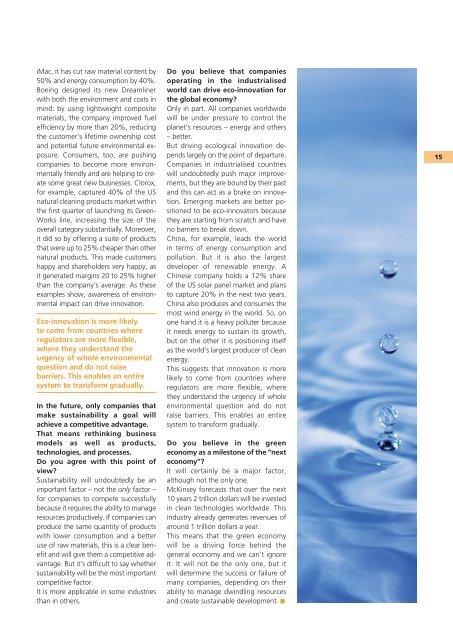SD Vision - Halyps Cement
SD Vision - Halyps Cement
SD Vision - Halyps Cement
You also want an ePaper? Increase the reach of your titles
YUMPU automatically turns print PDFs into web optimized ePapers that Google loves.
iMac, it has cut raw material content by<br />
50% and energy consumption by 40%.<br />
Boeing designed its new Dreamliner<br />
with both the environment and costs in<br />
mind: by using lightweight composite<br />
materials, the company improved fuel<br />
effi ciency by more than 20%, reducing<br />
the customer’s lifetime ownership cost<br />
and potential future environmental exposure.<br />
Consumers, too, are pushing<br />
companies to become more environmentally<br />
friendly and are helping to create<br />
some great new businesses. Clorox,<br />
for example, captured 40% of the US<br />
natural cleaning products market within<br />
the fi rst quarter of launching its Green-<br />
Works line, increasing the size of the<br />
overall category substantially. Moreover,<br />
it did so by offering a suite of products<br />
that were up to 25% cheaper than other<br />
natural products. This made customers<br />
happy and shareholders very happy, as<br />
it generated margins 20 to 25% higher<br />
than the company’s average. As these<br />
examples show, awareness of environmental<br />
impact can drive innovation.<br />
Eco-innovation is more likely<br />
to come from countries where<br />
regulators are more fl exible,<br />
where they understand the<br />
urgency of whole environmental<br />
question and do not raise<br />
barriers. This enables an entire<br />
system to transform gradually.<br />
In the future, only companies that<br />
make sustainability a goal will<br />
achieve a competitive advantage.<br />
That means rethinking business<br />
models as well as products,<br />
technologies, and processes.<br />
Do you agree with this point of<br />
view?<br />
Sustainability will undoubtedly be an<br />
important factor – not the only factor –<br />
for companies to compete successfully<br />
because it requires the ability to manage<br />
resources productively. If companies can<br />
produce the same quantity of products<br />
with lower consumption and a better<br />
use of raw materials, this is a clear benefi<br />
t and will give them a competitive advantage.<br />
But it’s diffi cult to say whether<br />
sustainability will be the most important<br />
competitive factor.<br />
It is more applicable in some industries<br />
than in others.<br />
Do you believe that companies<br />
operating in the industrialised<br />
world can drive eco-innovation for<br />
the global economy?<br />
Only in part. All companies worldwide<br />
will be under pressure to control the<br />
planet’s resources – energy and others<br />
– better.<br />
But driving ecological innovation depends<br />
largely on the point of departure.<br />
Companies in industrialised countries<br />
will undoubtedly push major improvements,<br />
but they are bound by their past<br />
and this can act as a brake on innovation.<br />
Emerging markets are better positioned<br />
to be eco-innovators because<br />
they are starting from scratch and have<br />
no barriers to break down.<br />
China, for example, leads the world<br />
in terms of energy consumption and<br />
pollution. But it is also the largest<br />
developer of renewable energy. A<br />
Chinese company holds a 12% share<br />
of the US solar panel market and plans<br />
to capture 20% in the next two years.<br />
China also produces and consumes the<br />
most wind energy in the world. So, on<br />
one hand it is a heavy polluter because<br />
it needs energy to sustain its growth,<br />
but on the other it is positioning itself<br />
as the world’s largest producer of clean<br />
energy.<br />
This suggests that innovation is more<br />
likely to come from countries where<br />
regulators are more fl exible, where<br />
they understand the urgency of whole<br />
environmental question and do not<br />
raise barriers. This enables an entire<br />
system to transform gradually.<br />
Do you believe in the green<br />
economy as a milestone of the “next<br />
economy”?<br />
It will certainly be a major factor,<br />
although not the only one.<br />
McKinsey forecasts that over the next<br />
10 years 2 trillion dollars will be invested<br />
in clean technologies worldwide. This<br />
industry already generates revenues of<br />
around 1 trillion dollars a year.<br />
This means that the green economy<br />
will be a driving force behind the<br />
general economy and we can’t ignore<br />
it. It will not be the only one, but it<br />
will determine the success or failure of<br />
many companies, depending on their<br />
ability to manage dwindling resources<br />
and create sustainable development.<br />
15


